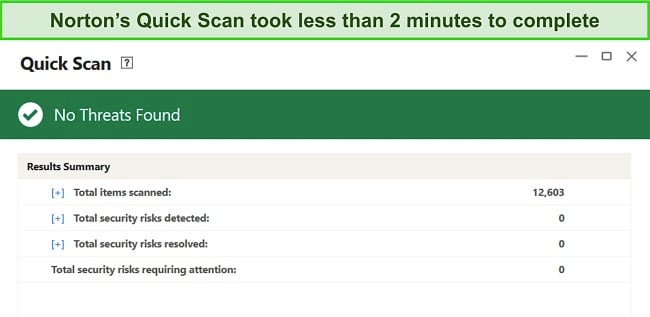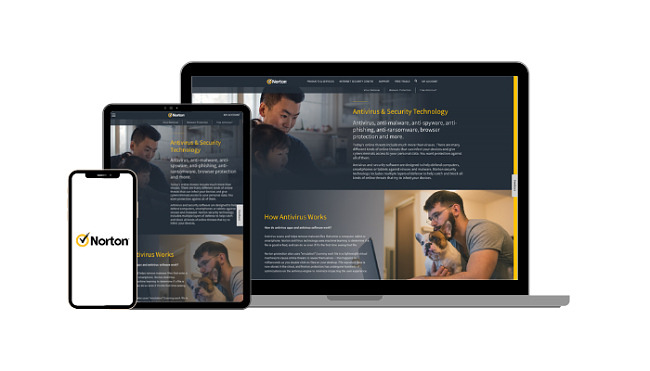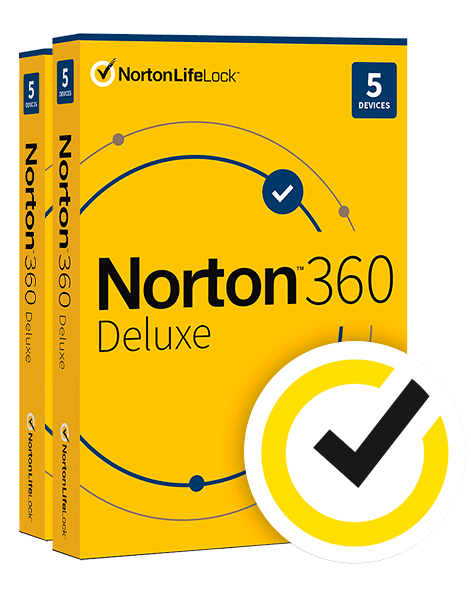How Much Does Antivirus Software Cost in 2025? (Full Study)
With so many antiviruses on the market for all budgets and needs, it’s very difficult to make a choice. You’ll find very expensive antiviruses and those that you may consider outright cheap. However, the deciding factor in your choice shouldn’t only be the price, but also the value you get from each antivirus offering.
Some factors that influence antivirus pricing are features, level of protection, and performance. To pick the right antivirus, you’ll need to choose the one that offers good value on all fronts at a decent price.
While some people are okay with basic protection, I suggest going for an antivirus that offers comprehensive protection at an affordable price. My top choice is Norton which starts at just . Plus, Norton is backed by a risk-free 60-day money-back guarantee.
What Is Antivirus Software and What Does It Do?
Antivirus software is a program designed to detect, prevent, and remove malware from your computer. It acts as a shield against various cyber threats, including viruses, worms, spyware, and ransomware. Its primary function is to scan your system for malicious software and neutralize it before it can cause harm.
To remove malware, antiviruses offer scanning options to check your system for malware. These scanning options include:
- Full system scan — It thoroughly checks every file and folder on your computer.
- Quick scan — It rapidly scans critical locations where malware is likely to hide.
- Scheduled scan — It allows you to set a specific time for the software to run automated scans.
- Custom scan — It lets you select specific files or folders to scan.
In the detection process, it employs several methods:
- Signature-based detection — It compares known malware signatures to files on your computer. If a match is found, it flags the file as malicious.
- Heuristic-based detection — It identifies unusual behavior or file structures, spotting unknown viruses by how they act.
- Behavior-based detection — It monitors the behavior of programs, identifying malicious actions.
- Cloud-based detection — It utilizes cloud technology for real-time updates on new threats, enhancing detection capabilities.
When a virus is detected, the antivirus software isolates it, preventing it from causing damage. In some cases, it attempts to repair the file or removes the virus entirely. Modern antivirus software usually goes beyond basic protection, offering additional features like firewall defenses, email protection, and web browsing security.
In my testing, I found that these extra layers significantly enhance your digital safety. Effective antivirus software not only identifies threats but also provides comprehensive protection against a wide range of cyber risks. When considering the cost, it’s crucial to weigh the value of robust security against the potential risks and losses associated with cyber threats.
How Much Do Antiviruses Actually Cost?
The price of antivirus software varies significantly across different products, reflecting the diversity in features, effectiveness, and brand reputation.
This wide price range ensures there’s an antivirus solution for every budget, but it also introduces complexity when determining the true value of each option. Understanding the cost implications is crucial for choosing the right antivirus that balances price with effective protection.
Here are some of the prices of top antiviruses on the market, so you can choose the one that suits your budget:
| Antivirus | Starting Price | Best Value Plan | Detection Rates | Number of Devices |
| Norton | /year | /year | 100% | 10 |
| TotalAV | $19.00/year | $39.00/year | 100% | 6 |
| McAfee | /year | $39.99/year | 100% | 10 |
| Intego | $19.99/year | /year | 99.4% | 5 |
| Bitdefender | $24.99/year | $40.99/year | 100% | 10 |
| Malwarebytes | /year | /year | 99.9% | 20 |
| Panda | $22.50/year | $40.50/year | 98% | unlimited |
| Avira | $26.99/year | $59.99/year | 100% | 5 |
| AVG | /year | /year | 100% | 10 |
| Avast | /year | /year | 100% | 10 |
Editor’s Note: We value our relationship with our readers, and we strive to earn your trust through transparency and integrity. We are in the same ownership group as some of the industry-leading products reviewed on this site: ExpressVPN, Cyberghost, Private Internet Access, and Intego. However, this does not affect our review process, as we adhere to a strict testing methodology.
Do You Still Need an Antivirus Software in 2025?
In 2025, you might wonder if antivirus software is still necessary. The answer is a resounding yes. Operating systems have indeed become more secure over time, but this only means that cybercriminals are developing new and more sophisticated ways to attack you.
Cybercriminals constantly evolve their tactics, making it a perpetual cat-and-mouse game between security and vulnerability. Threats like phishing, cryptojacking, ransomware, Identity Theft, Social Engineering, and more need advanced security to combat them.
Modern operating systems do incorporate basic security measures, but these are often not enough. Standalone antivirus software offers deeper and more comprehensive protection. They put more resources into detecting and mitigating a wide range of threats, from classic viruses to advanced malware like ransomware and spyware.
Moreover, the cost of antivirus software should be viewed as an investment in your online safety. While free options exist, paid versions offer more advanced features like real-time protection, secure banking tools, and identity theft prevention. These features play a critical role in safeguarding your sensitive information.
Finally, with the increasing number of connected devices and the growing sophistication of cyber attacks, relying solely on built-in OS security features may leave you vulnerable. Antivirus software complements these features, offering an additional layer of defense that adapts to new threats. Even Mac devices need the best antiviruses to protect against Mac-specific viruses.
Factors That Affect the Cost of Malware Protection
The cost of malware protection is influenced by several factors, and it’s not just about the company offering it.
The sophistication of the protection plays a critical role. High-end antivirus solutions, which I’ve tested, often incorporate advanced features like real-time monitoring, heuristic analysis, and AI-driven threat detection. These technologies require significant investment in research and development, contributing to a higher price tag.
Another factor is the range of services offered. Comprehensive packages providing additional tools like firewalls, VPNs, and identity theft protection typically cost more. These features enhance your overall security but require more complex infrastructure and support.
Brand reputation and market positioning also impact the price. Established brands with a proven track record may charge more, reflecting their reliability and trustworthiness in the field. In contrast, newer or less-known companies might offer competitive pricing to attract users.
In essence, when you’re considering the cost of antivirus software, you’re not just paying for basic malware defense. You’re investing in a suite of advanced features designed to provide robust and multi-layered protection against multiple cyber threats.
Are Cheap or Free Antiviruses Worth It?
Choosing between cheap or free antiviruses largely depends on your specific needs. In my experience, some low-cost antivirus solutions do offer adequate protection. However, you may be compromising on advanced features like real-time protection or specialized defenses against ransomware and phishing.
Free antivirus programs can be a viable option, especially if you’re on a tight budget. They generally provide fundamental virus detection and removal capabilities, which is certainly better than having no protection at all. However, these free versions often lack comprehensive security features like firewalls, online banking protection, or anti-spyware tools.
The key is to assess your usage patterns and vulnerability. If your online activities are minimal and don’t involve sensitive transactions, a basic free or low-cost antivirus might suffice. However, if you frequently engage in online banking, shopping, or handling sensitive data, investing in a more robust solution is advisable.
In summary, while cheap or free antiviruses can be sufficient for basic protection for Windows, and other devices, they fall short of fully protecting against more sophisticated cyber threats. It’s important to align your choice with your security needs and the level of risk you’re willing to accept.
How to Choose and Get an Antivirus Software
When choosing and getting antivirus software, you should consider factors such as the level of protection you need, the features offered, and your budget. Whether you’re a casual computer user, a professional, or someone who frequently engages in online transactions, the right antivirus software can significantly enhance your security.
Here’s a step-by-step guide on how to get antivirus software:
- Assess your needs — Reflect on your online activities. If you frequently handle sensitive data or engage in online transactions, you’ll need more comprehensive protection compared to casual web browsing.
- Check available options — Look into different antivirus programs. Compare their features, effectiveness, and user reviews. Pay attention to how well they handle threats like malware, ransomware, and phishing attacks.
- Consider budget and subscription plans — Determine how much you are willing to spend. Free versions offer basic protection, while paid versions provide advanced features. Check for subscription plans that suit your budget.
- Check compatibility — Ensure the antivirus software is compatible with your operating system and doesn’t overly strain your system’s resources. For Windows, check the best antiviruses for PCs.
- Download and install — Once you’ve made your choice, download the software from a reliable source. Follow the installation instructions carefully to ensure it’s set up correctly.
- Run a scan — After installation, run a full system scan. This will check your system for any existing threats and provide an initial assessment of your system’s health. Regular scans are essential for ongoing protection.
Remember, the right antivirus software is not just about protecting against viruses; it’s an investment in your overall online safety and privacy.
Avoid These Buying Mistakes
When purchasing antivirus software, avoiding certain common mistakes can ensure you get the most effective and suitable protection for your needs. Here’s a list of mistakes to avoid:
- Ignoring feature set — Don’t overlook the specific features of antivirus software. Ensure it meets your specific needs, such as offering real-time protection, firewall integration, or identity theft protection. Buying a basic antivirus just to save cost can leave you vulnerable to emerging threats.
- Choosing price over quality — While budget is important, prioritizing cost over quality can compromise your security. Sometimes, investing a bit more can offer significantly better protection.
- Disregarding subscription terms and auto-renewals — Understand the subscription terms, including auto-renewal policies and cancellation procedures, to avoid unexpected charges.
- Falling for false advertising — Be wary of bold claims or scare tactics used in some advertisements. Stick to reputable sources and verified information from review sites like WizCase.
- Not considering future needs — Antivirus needs can evolve. Choose software that offers scalability or additional features that you might require in the future.
- Overlooking system compatibility — Check that the antivirus is compatible with your operating system and hardware. A program that heavily strains your system can impact performance.
- Overlooking multi-device needs — If you have multiple devices, ensure the antivirus solution covers them all without needing separate subscriptions.
- Skipping free trials — Not utilizing free trials can lead to dissatisfaction. Trials help you gauge the software’s usability and effectiveness before committing.
- Committing for a short period only — Opting for short-term subscriptions can be costlier in the long run. Longer commitments often come with significant discounts, reducing overall costs.
How to Stay Safe Online
Staying safe online is important in today’s world. Here are some best practices to ensure your online safety:
- Use strong, unique passwords — Create complex passwords that are difficult to guess. Use a mix of letters, numbers, and symbols, and avoid using the same password across multiple sites.
- Use antivirus software — Install and use reliable antivirus software to detect and prevent malware infections. Take a look at the best antivirus options on the market.
- Monitor your online accounts — Regularly check your online accounts for any unauthorized activity.
- Update software regularly — Keep your operating system, antivirus software, and other applications updated. Regular updates often include security patches that protect against new threats.
- Enable two-factor authentication (2FA) — Add an extra layer of security by using 2FA. This requires a second form of identification beyond just a password.
- Be wary of suspicious emails and links — Don’t click on links or download attachments from unknown or suspicious sources. This can prevent phishing attacks and malware infections.
- Use secure networks — Avoid using public Wi-Fi for sensitive activities. If you must, use a VPN to encrypt your data. These antiviruses come bundled with a VPN.
- Regularly back up important data — Regularly back up your data to an external drive or cloud storage. This protects your data in case of a cyber-attack or system failure.
- Educate yourself about online threats — Stay informed about the latest cyber threats and learn how to recognize them.
- Limit personal information sharing — Be cautious about the amount of personal information you share online, especially on social media.
Following these practices can significantly reduce your risk of falling victim to cyber threats and help maintain your online safety.
The Overall Best Value Antivirus
1. Norton — Best-Value Antivirus for Comprehensive Protection
Key Features:
- Eliminates 100% of malware such as viruses, worms, ransomware, trojans, and rootkits.
- Blocks 100% of real-time malware threats.
- Offers 3 scanning options to remove malware from your device.
- Comes with a VPN, webcam protection, password manager, and other extra features.
- Provides a 60-day money-back guarantee.
Norton provides good value for money and comprehensive protection. There’s a plan for every user, from as low as . Norton offers solid malware protection abilities. During my tests, it removed 100% of prevalent malware discovered in the last 4 weeks — only a few top antiviruses are able to achieve this score.
To remove malware from your device, you only need to run a scan — with options available for Quick, Full, or Custom Scan. As threats evolve, Norton also improves its security, ensuring that no zero-day malware threat goes uncaught. Norton is an industry leader in this due to its sophisticated SONAR analysis, which blocks all real-time threats to keep you safe.

Norton comes with a wide range of features for comprehensive protection. They include:
- Secure VPN — Encrypts your internet connection to protect you from hackers and prying eyes when surfing the web.
- Password manager — Generates secure passwords for you, allowing you to store them in a secure vault.
- Smart firewall — Monitors inbound and outbound internet requests on your computer, protecting you from cybercriminals.
- Cloud backup — Provides encrypted file storage to securely keep all your sensitive files.
- Parental controls — Protects your kids from inappropriate content when browsing.
- PC SafeCam — Blocks unauthorized access to your device webcam.
- ID Theft Protection — Protects your information like bank details, credit card, address, and social media handles from fraud and identity theft.
One thing I really like about Norton is its wide device compatibility. There’s an app for every major operating system, including Windows, Mac, iOS, and Android. Installing the app takes only a few minutes, and once it’s done, you’ll find the interface to be user-friendly and easy to navigate. Whether you’re on desktop or mobile, Norton is easy to use.
Norton’s pricing plans start at just . Among the plans are the Norton 360 Standard, Norton 360 Deluxe, Norton 360 Select, and Norton 360+ Lifelock plan that offers ID protection for US residents. I recommend Norton 360 Deluxe because of its blend of features at an affordable price. You can try it risk-free using the 60-day money-back guarantee.
Protect Yourself With Reliable Antivirus Software
Antivirus software is necessary to protect you from malware and other threats, but not all options on the market are budget-friendly. While cost plays a major role in choosing antivirus software, there’s more to antivirus than just the price. Factors like features, level of protection, performance, and more, determine the value you’ll get from an antivirus.
I tested over 50 antiviruses, each offering different prices, features, and ease of use. I discovered that not all expensive antivirus solutions are worth it. The best antiviruses are priced decently while offering comprehensive protection. From my tests, Norton is the best antivirus because it provides great value for money, and the price starts at just /month.
FAQ About How Much Does Antivirus Software Cost
How much does antivirus software actually cost?
Antivirus software prices vary widely, accommodating various budgets. Top-tier options like Norton start as low as , offering a balance of features, performance, and brand reliability. On the other hand, TotalAV which costs $19.00, also provides comprehensive protection.
The cost typically reflects the level of features offered, with more advanced capabilities and brand reputation influencing the pricing. This variety ensures that there is an antivirus solution suitable for different financial constraints and security needs.
Should I get a free antivirus instead of a paid one?
Opting for a free antivirus is better than having no protection at all, as it provides a basic defense against common cyber threats. However, if your budget allows, choosing a paid antivirus is worth the investment.
Paid versions offer more comprehensive security features, including advanced malware detection, real-time protection, and additional tools like firewalls and identity theft protection. These advanced features provide protection against sophisticated cyber threats, making the investment in a paid antivirus a better decision choice.
What’s the best overall antivirus software?
Norton is the best overall antivirus software, thanks to its comprehensive protection capabilities. It excels in various aspects, including robust malware detection, advanced ransomware protection, and impressive internet security features — all at a very affordable price.
Norton has minimal impact on system resources, ensuring smooth performance. Additionally, it offers valuable extras like a VPN, parental controls, and identity theft protection, to keep you safe from emerging threats. Its user-friendly interface and reliable customer support further solidify its position as a top choice in antivirus solutions.
Summary — Best Overall Antivirus in 2025
Editor's Note: We value our relationship with our readers, and we strive to earn your trust through transparency and integrity. We are in the same ownership group as some of the industry-leading products reviewed on this site: ExpressVPN, Cyberghost, Private Internet Access, and Intego. However, this does not affect our review process, as we adhere to a strict testing methodology.





Leave a Comment
Cancel